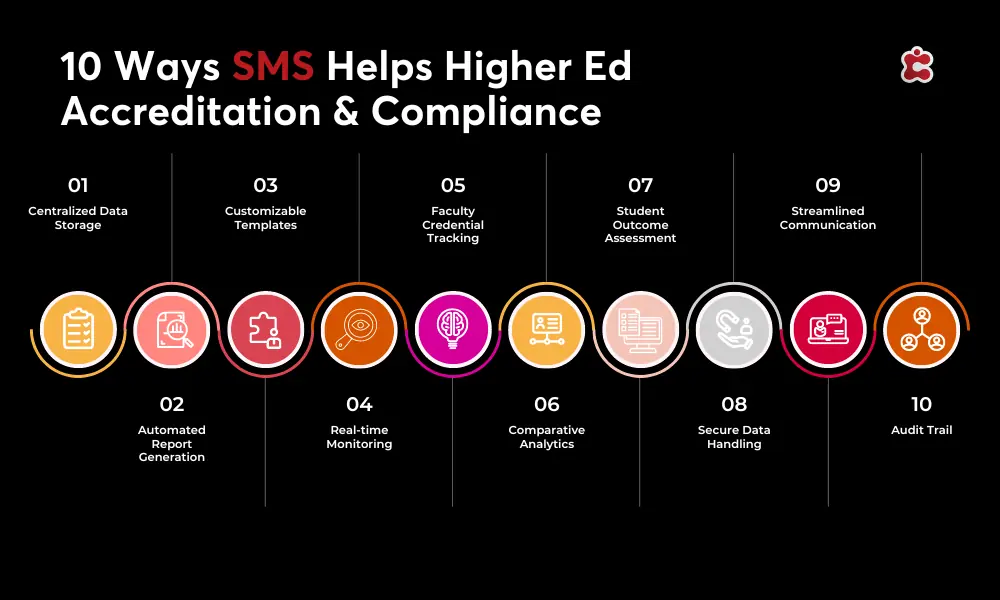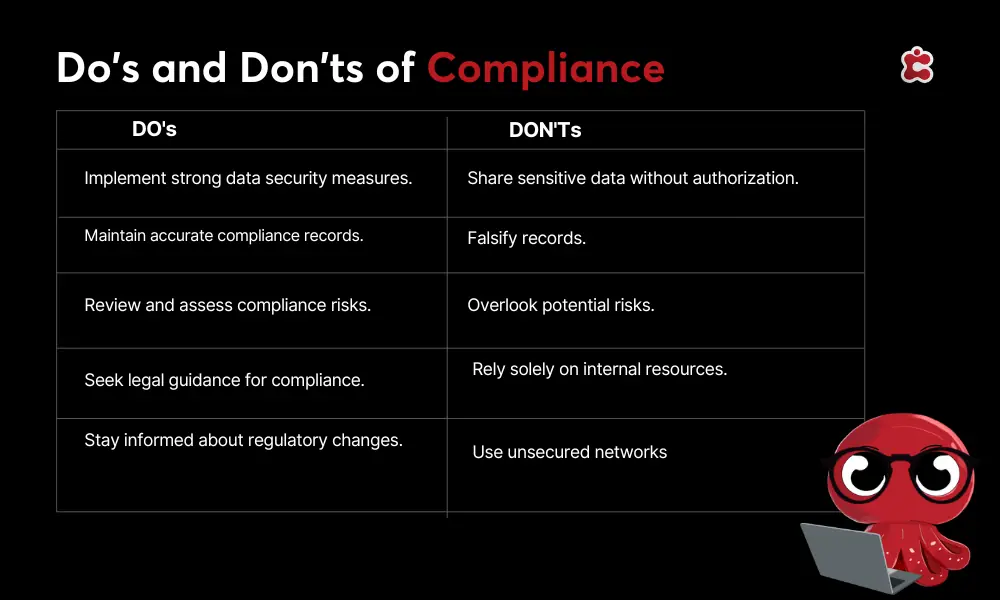When someone shops for a new service or product, they look for a seal of approval. Higher educational institutions operate in much the same way, with accreditation serving as this essential seal. Accreditation signifies that an institution meets established standards of quality and rigor. Just as critical is regulatory compliance, which ensures institutions adhere to governmental and educational standards. Compliance helps maintain accountability and transparency, safeguarding the interests of students, staff, and the broader community.
But how can your institution ensure that it not only meets but also maintains these high standards?
This is where School Management Systems (SMS) come into play. These comprehensive software solutions streamline educational institutions’ administrative and academic operations. SMS makes it easier for schools to track and report on various metrics required for accreditation and regulatory compliance. Imagine having all the necessary information at your fingertips, ready for any audit or review process.
Here’s how SMS assists higher education institutions in meeting accreditation standards and regulatory compliance.

Understanding Accreditation Standards and Compliance Requirements
Let’s start by breaking down accreditation standards and compliance requirements, which are crucial for maintaining the quality and integrity of higher education institutions.
Accreditation Standards
Accreditation is all about meeting specific standards set by different accrediting bodies. These bodies can be regional, national, or programmatic. For example, in the U.S., regional accrediting bodies like the Higher Learning Commission (HLC) or the Southern Association of Colleges and Schools (SACS) are key players. National bodies, such as the Accrediting Commission of Career Schools and Colleges (ACCSC), and program-specific accreditors, like the Accreditation Board for Engineering and Technology (ABET), focus on specific types of institutions or programs.
So, what do these accrediting bodies look at? Here are some key areas:
- Curriculum Quality: Ensuring educational programs are rigorous, relevant, and current.
- Faculty Qualifications: Making sure instructors have the right credentials and expertise.
- Student Outcomes: Evaluating metrics like graduation rates, job placement rates, and student satisfaction.
Each accrediting body has its own criteria, but these core areas are pretty standard across the board.
Compliance Requirements
Beyond accreditation, schools must follow various rules set by the government and educational authorities. These rules ensure that institutions operate legally and ethically while providing a high standard of education.
Some key compliance areas include:
- Data and Reporting Requirements: Schools need to submit detailed reports on enrollment, financial aid, graduation rates, and more. For example, the Integrated Postsecondary Education Data System (IPEDS) requires detailed data submissions from all higher education institutions in the U.S.
- Privacy and Security Standards: Compliance with laws like the Family Educational Rights and Privacy Act (FERPA) ensures that student information is protected and managed properly. Additionally, regulations like the General Data Protection Regulation (GDPR) in Europe set standards for data protection and privacy.
- Financial Accountability: Schools must show sound financial practices and transparency, often through audits and financial reporting.
Role of SMS in Data Management
Now that we understand what accreditation and compliance entail let’s delve into the role of School Management Systems in data management. Thus, essentially, SMS supports higher education institutions in meeting accreditation standards and regulatory compliance.
SMS serves as the backbone of efficient data management in higher education. With all data housed in one location, institutions can swiftly access and retrieve information needed for accreditation reports and compliance submissions. This eliminates the need for manual searching through disparate systems or cumbersome paperwork, saving time and reducing administrative burden.
With all data housed in one location, institutions can swiftly access and retrieve information needed for accreditation reports and compliance submissions. This eliminates the need for manual searching through disparate systems or cumbersome paperwork, saving time and reducing administrative burden.
Centralized data management with SMS incorporates robust security measures to safeguard sensitive information. This is vital for compliance with regulations such as the Family Educational Rights and Privacy Act (FERPA) and the General Data Protection Regulation (GDPR), ensuring the protection of student and institutional data.
Efficient Reporting and Documentation
Reporting and documentation are the foundation of accreditation and compliance efforts. Without accurate and comprehensive reports, institutions may struggle to meet the stringent standards set by accrediting bodies and regulatory authorities. Here’s how SMS automates the generation of reports required for accreditation and compliance:
- SMS comes equipped with built-in templates tailored to the requirements of accrediting bodies and regulatory authorities. These templates cover a wide range of reports, from enrollment statistics to financial data, ensuring institutions have the necessary documentation readily available.
- SMS automatically compiles data from various sources within the institution, eliminating the need for manual data entry and ensuring accuracy in reporting.
- Institutions can schedule automated report generation at regular intervals, ensuring timely submission of required documentation without the need for manual intervention.
Moreover, SMS offers flexibility in creating customized reports to meet specific accreditation needs. Institutions can tailor report parameters, data fields, and formatting according to the unique requirements of their accrediting bodies or internal quality assurance processes. This flexibility empowers institutions to showcase their strengths and address areas for improvement effectively. Whether it’s generating reports on student outcomes, faculty qualifications, or program effectiveness, SMS provides the tools necessary to meet

Enhancing Institutional Accountability and Transparency
Institutional accountability and transparency are essential pillars in the realm of higher education accreditation and compliance.
- SMS allows for continuous monitoring of key metrics and performance indicators. This provides institutions with immediate insights into their compliance status and accreditation progress.
- Through centralized data storage and comprehensive documentation features, SMS enables institutions to maintain detailed, auditable records.
- SMS automates the generation of reports required for accreditation submissions. Thus ensuring accuracy and timeliness while reducing administrative burden.
- With built-in compliance tracking functionalities, SMS helps institutions stay abreast of regulatory requirements and deadlines.
- By identifying potential compliance risks and areas for improvement, SMS empowers institutions to address issues before they escalate proactively.
- SMS employs robust data security measures to safeguard sensitive information and ensure the integrity and confidentiality of accreditation-related data.
- These platforms allow institutions to compare their performance against industry standards and peer institutions through comparative analytics and benchmarking tools.
Classter’s SMS for Accreditation and Compliance
Classter’s School Management System is uniquely positioned to support higher education institutions in meeting these rigorous requirements. Here’s how Classter empowers institutions to achieve accreditation and compliance:
- Classter’s advanced reporting and analytics enable institutions to make data-driven decisions. The system enhances academic programs and ensures compliance with accreditation standards.
- Classter offers customizable modules and scalable solutions, allowing institutions to tailor the system to their unique needs. Institutions can rest assured that they are in compliance with accreditation standards as their institution grows.
- Cloud-based architecture offers unparalleled flexibility and accessibility, allowing institutions to access critical data and functionalities from anywhere, anytime. This ensures continuity of operations and compliance with accreditation standards, even in remote or distributed environments.
Book a demo today and discover how Classter can help your institution achieve accreditation and compliance with ease. Don’t miss out on the opportunity to revolutionize your educational ecosystem. Schedule your demo now!
FAQ’s
School Management Systems (SMS) facilitate efficient data management, automated reporting, and real-time tracking of academic progress, ensuring institutions meet accreditation standards and regulatory compliance requirements.
Yes, School Management Systems like Classter offer customizable modules and scalable solutions, allowing institutions to tailor the system to their specific requirements. This ensures that the SMS can adapt to the unique workflows and processes of different educational institutions.
Classter employs robust security measures and compliance with regulations such as the Family Educational Rights and Privacy Act (FERPA) and the General Data Protection Regulation (GDPR) to ensure the security and privacy of student and staff data, building trust within the school community.

